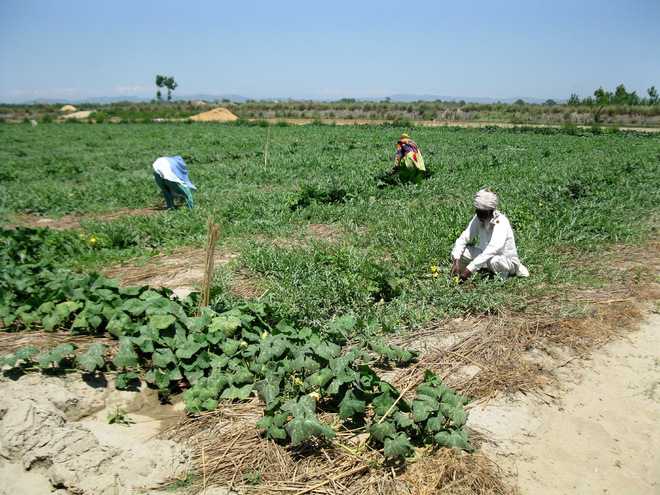Rajesh Sharma
Una, April 25
With the day temperature beginning to rise in lower regions of the state, vast spans of the dry Swan riverbeds have turned lush green with summer crop like cucumber, melons, gourds, tomato and pumpkin.
The vegetable cultivators from Baas Bareilly district of Uttar Pradesh called as ‘Rais’ put to use their traditional practices every year, churning out thousands of tonnes of vegetable that finds its way into the markets of Himachal Pradesh, besides Punjab, Delhi and Haryana.
In summers, the wet portion of the 700-m-wide Swan shrinks to about 50m, leaving the remaining major portion for the Rais to cultivate. The farmers come back from their native villages in November when they begin laying trenches filled with manure, in which the seed is sown. The subsurface moisture enables the seeds to germinate and sustain life even when the temperature soars to 43°C.
Bacche Khan, who has cultivated water melon, bottle gourd and cucumber on about 30 kanals, said life was not easy for them as all family members toil in the winters and brave the scorching sun all day and sleep in unelectrified thatched huts along the river. In all, he said there were about 2,000 families from Baas Bareilly who come here every year and cultivate vegetables on about 50,000 kanals.
Receding subsurface moisture, soaring prices of farm yard manure, erratic rain pattern and lack of support from the state agriculture department is gradually moving away the future generations from vegetable cultivation, said Nisar Ali, another farmer.
Meanwhile, scientist in-charge of the Una Krishi Vigyan Kendra, Dr AR Khan said the technique of the Rais was unique and has been documented by the HP Agriculture University Palampur. It is, however, learnt that the main problem for the Rais was lack of adequate finances since local banks did not give them credit and they were forced to take advances on high interest rates from local commission agents.
Unlock Exclusive Insights with The Tribune Premium
Take your experience further with Premium access.
Thought-provoking Opinions, Expert Analysis, In-depth Insights and other Member Only Benefits
Already a Member? Sign In Now










